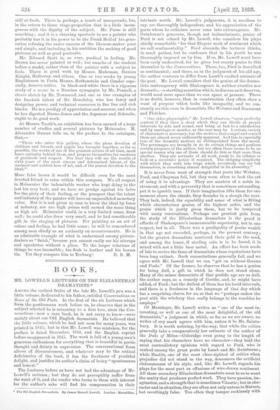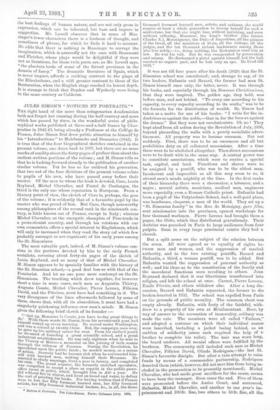BOOKS.
MR. LOWELL'S LECTURES ON THE ELIZABETHAN DRAMATISTS.*
AMONG the earliest fruits of the late Mr. Lowell's pen was a little volume, dedicated to his father, entitled Conversations on Some of the Old Poets. In the first of the six Lectures which form the posthumous work before us, he observes that in the subject selected he is returning to a first love, since the Con- versations—now a rare book, he is not sorry to know—were mainly about our Old English dramatists. He believed that the little volume, which he had not seen for many years, was printed in 1843; but in this Mr. Lowell was mistaken, for the preface is dated December, 1844, and the English reprint before us appeared in 1845. The work is full of a young man's generous enthusiasm for everything that is beautiful in poetic thought and dainty in expression. The conversational form allows of discursiveness, and whatever may be the critical deficiencies of the book, it has the freshness of youthful delight, and justifies its author's claim of being "spontaneous and honest."
The Lectures before us have not had the advantage of Mr. Lowell's revision ; but they do not perceptibly suffer from the want of it, and the reader who turns to them with interest for the author's sake will find his compensation in their
• The Otd English Drametitte. By Samosa Rumen Lowell. London : Macmillan.
intrinsic worth. Mr. Lowell's judgments, it is needless to say, are thoroughly independent, and his appreciation of the poets whom he criticises never runs into extravagance. Mr.. Swinburne's generous, though not indiscriminate, praise of Ford is not echoed by Mr. Lowell, who considers his plays chiefly remarkable "for that filagree work of sentiment which we call sentimentality." Ford abounds, the lecturer thinks, in mock pathos, but he confesses that in his youth he was thoroughly imposed on by him. If so, Mr. Lowell must have been early undeceived, for he gives but scanty praise to this dramatist in the Conversations. There, too, Ford is described,
as sentimental ; and there, as in the judgment of his old age, the author ventures to differ from Lamb's exalted estimate a the poet. Mr. Lowell considers that the genius of the drama-
tists contemporary with Shakespeare is neither creative nor dramatic,—a startling assertion which, to discuss as it deserves, would need more space than we can spare at present. There is no doubt, however, that in construction they often show a want of purpose which looks like incapacity, and we con- stantly see this even in dramatists like Webster and Beaumont and Fletcher.
"Our older playwrights," Mr. Lowell observes, "seem perfectly content if they have a story which they can divide at proper intervals by acts and scenes, and bring at last to a satisfactory- end by marriage or murder, as the case may be A certain variety of characters is necessary, but the motives that compel and control them are almost never sufficiently apparent. And this is especially true of the dramatic motives as distinguished from the moral. The personages are brought in to do certain things and perform. certain purposes of the author, but too often there seems to be no special reason why one of them should do this or that more than another. They are servants of all work, ready to be villains or fools at a moment's notice if required. The obliging simplicity with which they walk into traps which everybody can see but themselves, is something almost delightful in its absurdity."
It is never from want of strength that poets like Webster, Ford, and Chapman fail, but they seem often to lack the art. of using it to advantage. They are masters of a noble in- strument, and with a perversity that is sometimes astounding, put it to ignoble uses. If their imagination lifts them for one moment above the clouds, they flounder in a slough the next. They lack, indeed, the equability and sense of what is fitting- which characterises genius of the highest order, and the praise which is justly given them, has to be tempered with many reservations. Perhaps our greatest gain from the study of the Elizabethan dramatists is the proof it affords of Shakespeare's immeasurable superiority, not in one respect, but in all. There was a prodigality of poetic wealth in that age not exceeded, perhaps, in the present century; but the greater dramatists scattered their gold in the mud, and among the lesser, if sterling coin is to be found, it is: mixed with not a little base metal. An effort has been made of late to revive the fame of dramatists whose reputations have been long extinct. Such resusoitations generally fail, and we agree with Mr. Lowell that we can "get on without Greene. and Peele." Of the former, he observes that he has a genius
for being dull, a gift in which he does not stand alone. Many of the minor dramatists of that prolific age are as dull, the author says, as a comedy of Goethe, and, he might have added, of Ford; but the dullest of them has his lucid intervals,. and there is a freshness in the language of that day which has a surprising charm for us, so that we "perhaps endow the poet with the witchery that really belongs to the vocables he employs."
Of Messinger, Mr. Lowell writes as "one of the most in- teresting, as well as one of the most delightful, of the old dramatists," a judgment in which, so far as we are aware, no writer of any mark agrees with him, unless it be Mr. Saints- bury. It is worth noticing, by-the-way, that while the critics. generally take a comparatively low estimate of the author of the Duke of Milan—Coleridge even going to the length of saying that his characters have no character—they hold the most contradictory opinions with regard to Ford, who is- ranked among the great poets by Lamb and Mr. Swinburne s while Hazlitt, one of the most clear-sighted of critics when prejudice did not stand in the way, denounces the artificial elaborateness of his style, and, like Mr. Lowell, regards his- plays for the most part as effusions of wire-drawn sentiment All these secondary Elizabethan dramatists seem to us to want the sanity that produces perfect work. They have passion, im- agination, and a strength that is sometimes Titantic; but in ohm- nester and in situation, they are often not only untrue to Nature, but revoltingly false. Too often they tamper recklessly with the best feelings of human nature, and are not only gross in expression, which can be tolerated, but base and impure in suggestion. Mr. Lowell observes that in some of lias. singer's lower characters there is a foulness of thought, and sometimes of phrase, for which he finds it hard to account. He adds that there is nothing in Massinger to corrupt the imagination, which is assuredly not the ease with Beaumont and Fletcher, whose plays would be delightful if they were not so licentious, for these twin poets are, as Mr. Lowell says, "the absolute lords of some of the fairest provinces in the domain of fancy." The dramatic literature of Spain, which is never impure, affords a striking contrast to the plays of the Elizabethans, and a still greater contrast to those of the Restoration, when the English stage reached its lowest depth. It is strange to think that Dryden and Wycherly were living in the same century as Calderon.







































 Previous page
Previous page